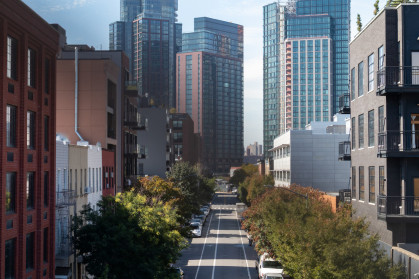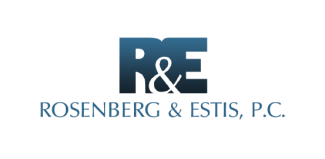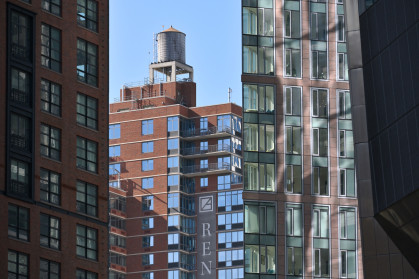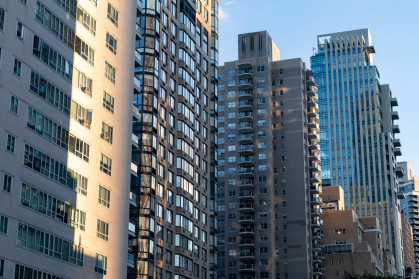Navigating funding obstacles faced by condo and co-op buildings complying with Local Law 97 (Part III)
- Owners or shareholders may not be able to afford significant increases
- Large assessments or monthly increases could deter prospective buyers
- Condos buildings are more limited in how they can collateralize a loan

Condos face borrowing challenges because they can't collateralize the building.
iStock
Maneuvering through the financial maze of Local Law 97 compliance, co-op and condo buildings encounter an unexpected twist: their ownership structure limits funding to a few paths. These include hiking maintenance or common charges, imposing special assessments, dipping into their cash reserves, or taking out loans.
“Unfortunately, no method is perfect, and each alternative has a unique set of challenges,” says Adam R. Sanders of New York City real estate law firm Rosenberg & Estis.
[Note: This is Part III of a three-part series on helping NYC co-ops and condos comply with Local Law 97. You can read Part I: “Local Law 97 kicks off this January. Is your building on track.” and Part II “Financing options to help NYC buildings comply with Local Law 97 emissions limits."]
Energy-efficient upgrades are also very costly. Whether a condo or co-op board elects to allocate the debt through a special assessment or include in maintenance or common charges, they can have a significant impact on a building’s financial position, Sanders says.
A special assessment to make the necessary upgrades may require large payments over a short period of time, while maintenance/common charge increases become a permanent burden on unit owners and shareholders.
Worst-case scenarios
“There is the possibility that large assessments or monthly increases could deter prospective buyers from buying into a building,” says Michael T. Carr, a real estate attorney at Rosenberg & Estis.
Another potential pitfall, he says, is if unit owners or shareholders cannot afford to make such a significant payment each month.
“Co-op and condo boards need to plan for these worst-case scenarios,” Carr says. “One possible solution is for a board to identify a preferred lender who is willing to pre-qualify a building and to offer home equity lines of credit (HELOC) to shareholders or unit owners who prefer to finance their obligations.”
Special borrowing challenges for condo buildings
Some boards may want to consider borrowing to finance energy improvements. It is common for co-ops to borrow money because a cooperative corporation owns its property, which can be offered as collateral.
Borrowing by condo buildings is far less common and may not be an option for all condos.
Because condos do not own the building, they cannot collateralize real property, and the only collateral for the loan is monthly common charges, the board’s bank accounts, and reserve funds. Section 339-jj of the New York Condominium Act permits the board of managers to borrow money, but only to the extent that the condominium’s declaration or by-laws allow for such borrowing.
There are other complications. “Many governing condominium documents require the approval of unit owners for borrowing above a certain threshold, and acquiring the necessary majority or supermajority of unit owners is no easy feat,” Sanders says. Unit owners may be opposed to a board’s loan because there is no tax deduction for the interest payable on the loan—a cost fully incurred by unit owners, he points out.
Exploring additional financing options
New condominium buildings with some sponsor-controlled units may agree to allocate the funds from the sale of any sponsor-controlled units toward the payment of the upgrades.
“Alternatively, sponsors with unsold units may qualify for PACE financing and may shift the payment structure to the property tax bill,” Sanders says. “While the cost will still be borne by residents through their common charges, it may be less burdensome given the benefits of PACE financing.”
Co-ops are also eligible to receive PACE funding.
The New York City Energy Efficiency Corporation also offers the Multifamily Express Green (MEG) loan, specifically for condominiums and cooperatives implementing energy upgrades. MEG loans start at a minimum of $200,000 and can finance up to 90 percent of the project costs. Interest rates are set at 7 percent, and the term is the length of the construction period, plus a 10-year amortization period.
But buildings that already have loans may not be able to take on more debt, Carr points out.
“For condominiums or cooperatives with existing loans, the terms of those loans may outright prohibit additional or secondary debt. Secondary debt may be permissible, but only through the same lender,” he says. Careful review of both loan documents and underlying governing documents is critical to successful planning and implementation of Local Law 97 projects.
Rosenberg & Estis, P.C. is closely tracking all developments surrounding Local Law 97. Real estate attorneys Adam R. Sanders and Michael T. Carr are poised to answer any questions you have about the preparation of buildings for Local Law 97 compliance, as well as financing options.
Michael T. Carr and Adam R. Sanders are attorneys at Rosenberg & Estis, a top New York City real estate law firm. Rosenberg & Estis provides full-service representation and advice to co-op and condo boards, owners, developers, sponsors, and more.
Sign Up for our Boards & Buildings Newsletter (Coming Soon!)
Thank you for your interest in our newsletter. You have been successfully added to our mailing list and will receive it when it becomes available.




















